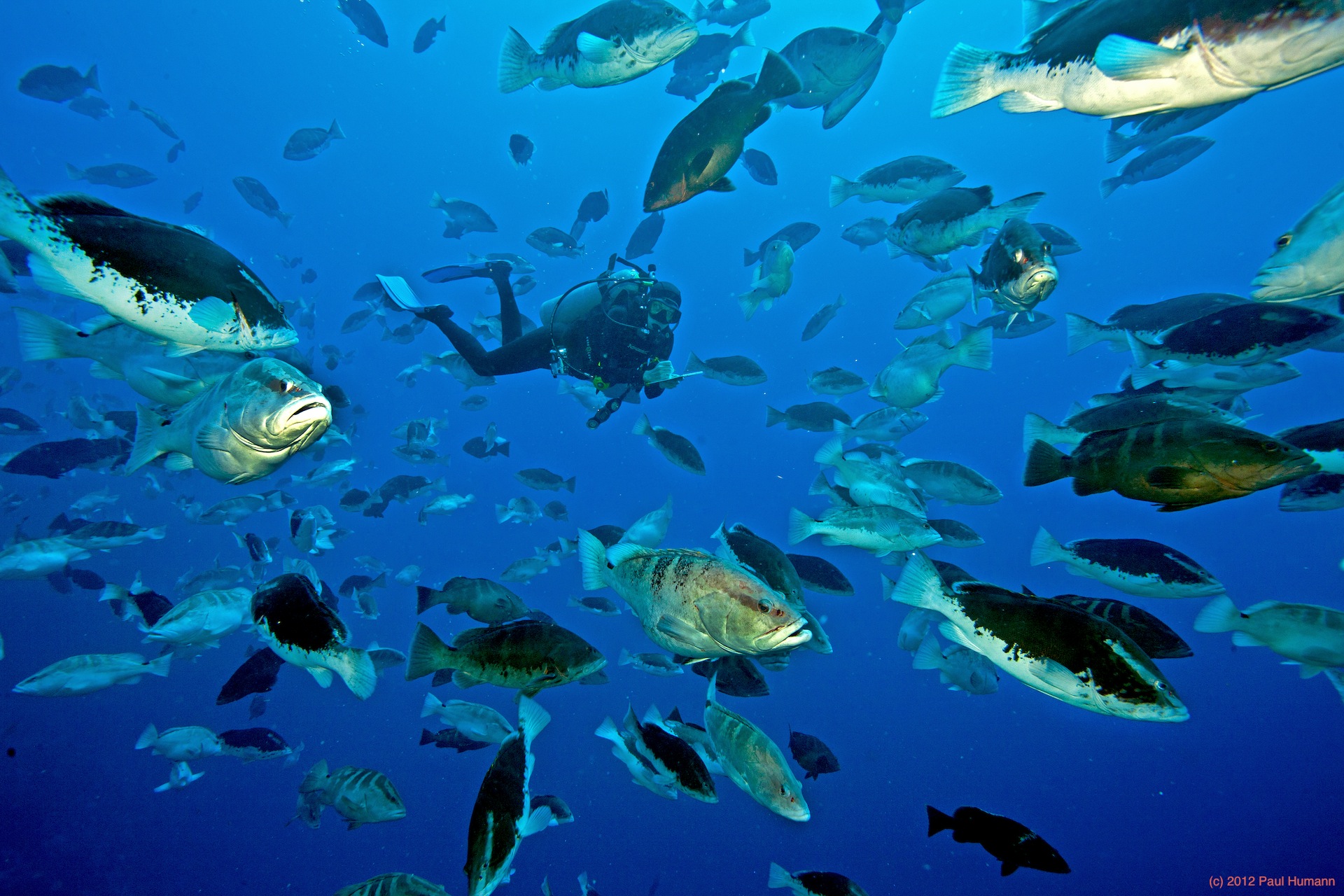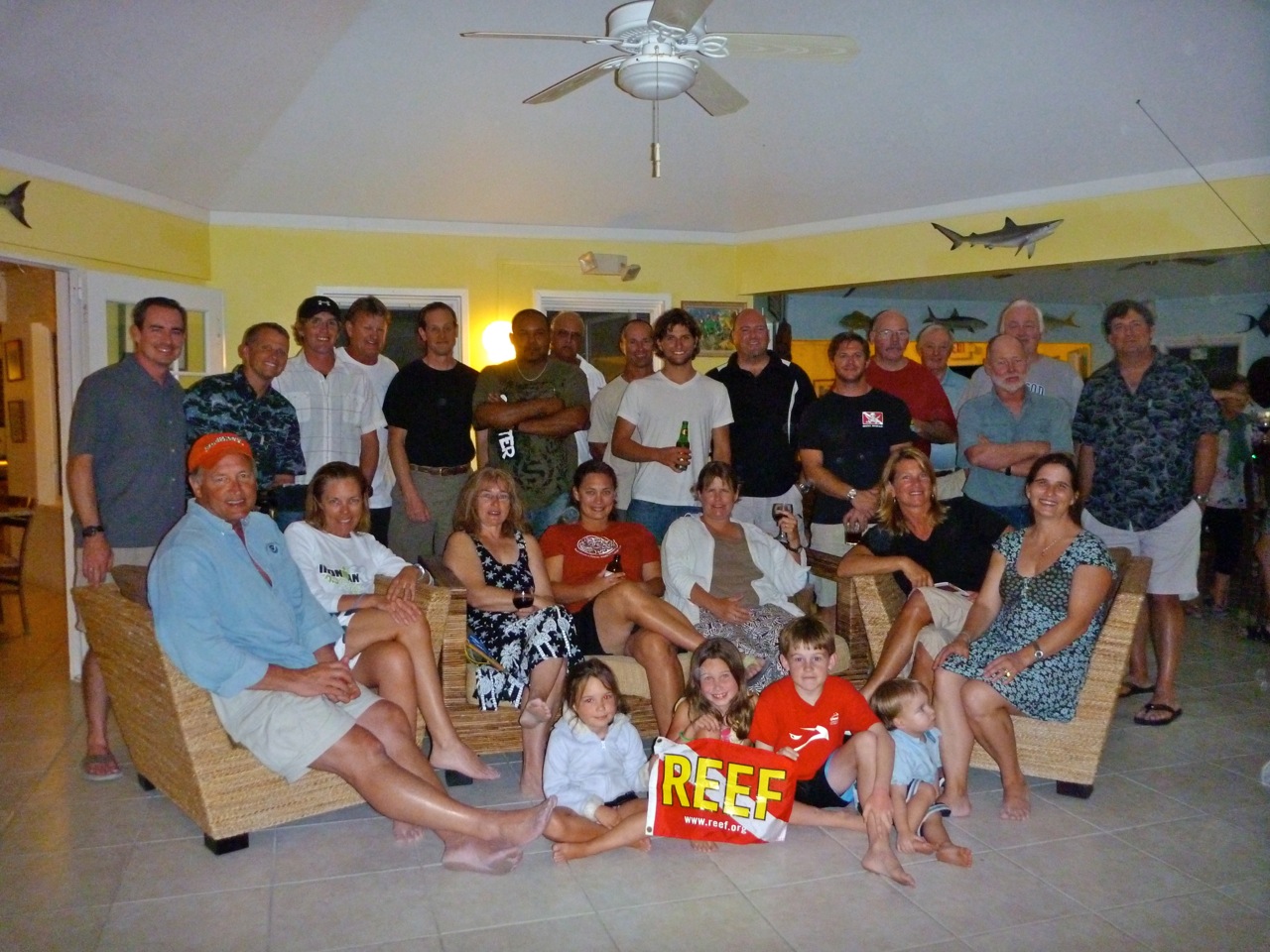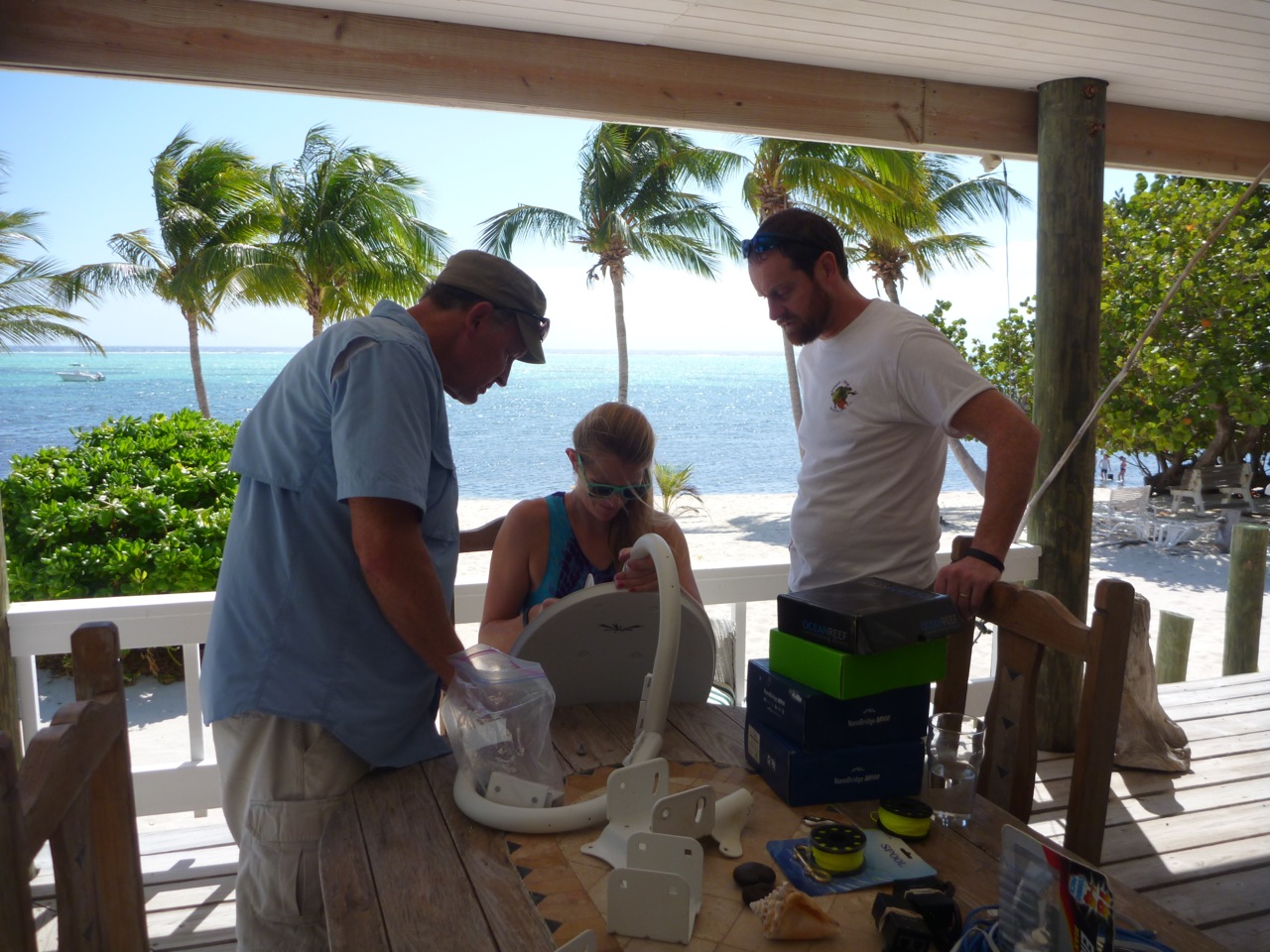Marine Life & Conservation
Inspiring The Next Generation To Save The Iconic And Endangered Nassau Grouper
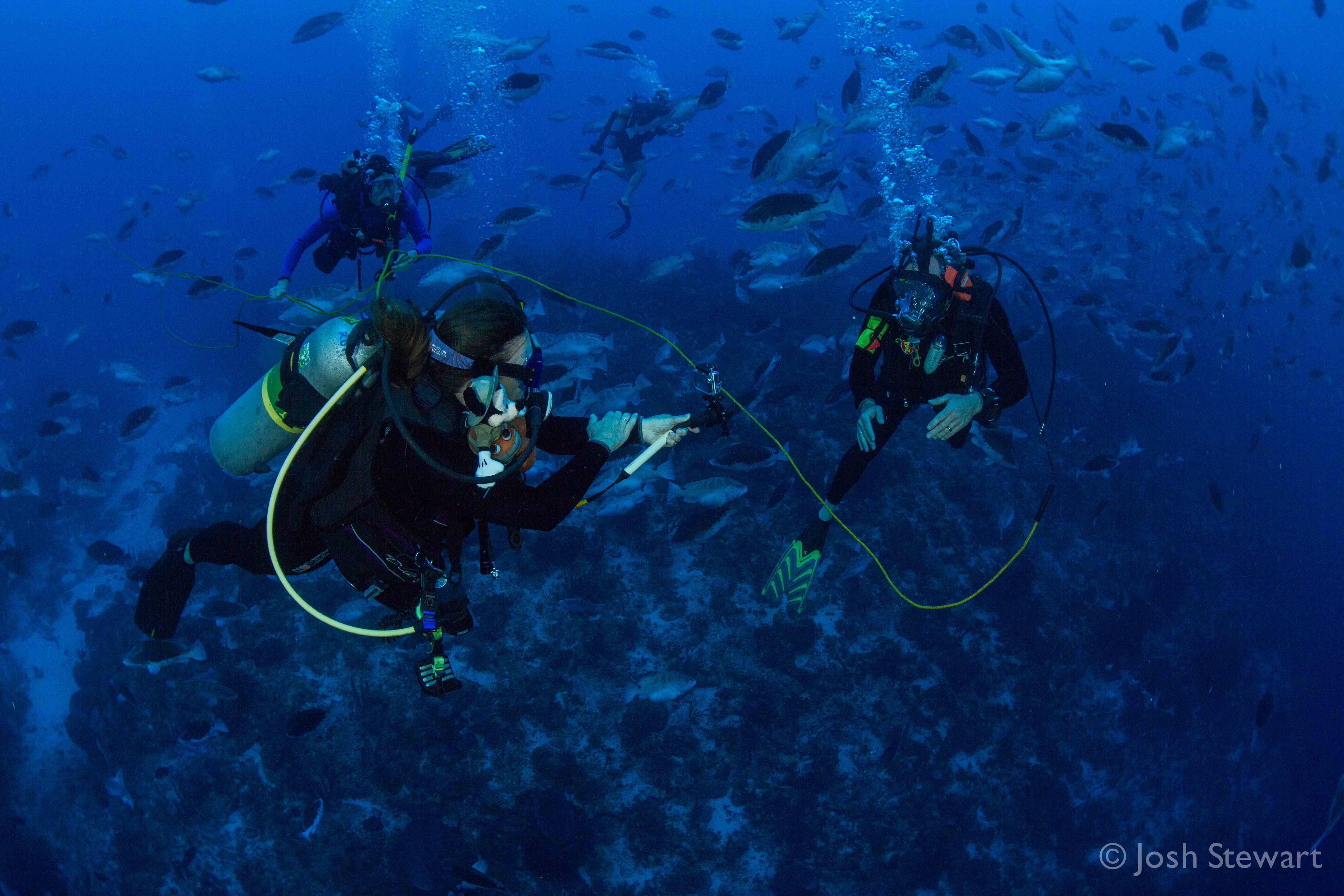
Live underwater webcasts from protected spawning site to local classrooms, and beyond, will visually teach important conservation lessons
As the winter full moon approaches, the Southern Cross Club on Little Cayman prepares for the annual arrival of the Grouper Moon Project team. Each year from late January to early February, scientists and volunteers of the Reef Environment Education Foundation (REEF) join staff from the Cayman Islands Department of the Environment (DOE) to document the last healthy, active and protected Nassau Grouper spawning site just off Little Cayman. The Southern Cross Club and others in the local community provide vital support to the team, recognizing that it takes an entire community to bring this historical and endangered species back from the brink of extinction.
In addition to documenting fish activity and population for valuable research data, the project also reaches out to local school children hoping to inspire them to join the conservation effort. It does this largely by streaming live video on the Internet from Little Cayman to local classrooms where children can see on a computer the work being done through the Grouper Moon Project. Two live webcasts are planned from underwater; one of them from the aggregation site where a scientist in scuba gear diving among the fish will show students what happens when Grouper spawn and why they are vulnerable at this time. He will also answer their questions about the mysterious and solitary fish that travels long distances to spawn at this site on Little Cayman. This year the webcasts are being streamed to classrooms in 10 schools on Grand Cayman, 3 schools on Cayman Brac, and for first time, the small school on Little Cayman.
“We’ve been expanding every year, adding more schools to the program because we get such good response,” says REEF educator Todd Bohannon, who with guidance from REEF scientists has developed the education curriculum. The webcasts lessons will be streamed from the aggregation site off the west coast of Little Cayman, from project headquarters at a house near the Southern Cross Club and from Bloody Bay Wall.
“The kids have an immediate connection to the lessons because it’s their history,” says Bohannon, who facilitates the webcasts between the scientists and the classrooms, fielding questions from the students. “They need to see the threat to the fish and these webcasts allow them to see it right in front of their eyes. We are giving them the tools they need to protect their environment and they are very enthusiastic, super smart and super excited.”
The hope is that by giving Caymanian kids a chance to see first hand what the scientists are doing to save the grouper, it will inspire them to continue the conservation work. Bohannon says the response from the children of Cayman Brac as been outstanding, and this year family evening events are planned.
“I can tell the Brac kids are talking to their families about the program because of their questions regarding fishing,” says Bohannon. “They get really excited, their reaction and comments are richer, and I like that.”
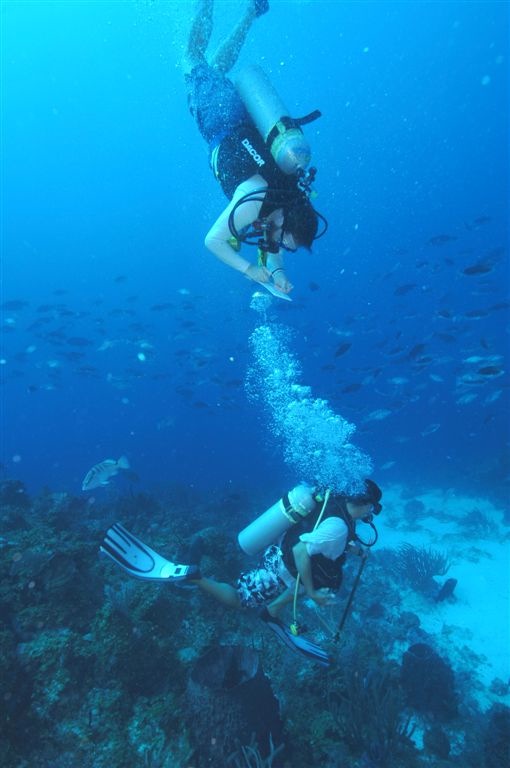 Although they’ve never seen the live feeds before, the students of the Little Cayman Education Service (LCES) School have always been aware of what happens on their island during the Grouper Moon.
Although they’ve never seen the live feeds before, the students of the Little Cayman Education Service (LCES) School have always been aware of what happens on their island during the Grouper Moon.
“They know what’s going on in Little Cayman when we come in and infiltrate the island!” says Bohannon. Last year Internet problems prevented a webcast in their classroom, so the Grouper Moon team made a personal visit to the classroom. “They loved it – it was great!”
Some of the live webcast lessons will be broadcasted from the porch at Peter Hillenbrand’s house near the Southern Cross Club. Hillenbrand, owner of the resort and a dedicated conservationist, is happy to have his house become “Grouper Moon central.” He enjoys being involved in the project and watching the marine scientists teach important lessons from his porch.
“The live broadcasts are one of the coolest learning tools I have ever seen,” he says. “It brings the Grouper Moon right into the class room, and there is nothing more important that educating our children about the world that surrounds them. There is not a better way to be amazed and learn other than being there yourself.”
Peter Hillenbrand and his team at the Southern Cross Club have been hosting the scientists and volunteers since the project began more than 12 years.
“We just take over the place – everyone is crashed out,” laughs a grateful Todd Bohannon, speaking for the entire Grouper Moon team. “This contribution is huge from a logistical point of view – Pete and his team always help out no matter what we need.”
“How do I prepare my house for the invasion? Ha! Well, I guess I try to make sure the sheets and towels are all clean, and my rum supply is abundant!” jokes Hillenbrand.
The good-natured camaraderie of the team enables and supports important conservation work being done. Nassau grouper has historically been one of the Caribbean’s most economically important fish, but intense harvesting during spawning aggregations has placed them on the endangered list. REEF is a volunteer organization and DOE has a limited research budget, so the project depends on volunteers, donations, fundraising and grants. Supporting the study are the Disney Worldwide Conservation Fund, Lenfest Ocean Program of the Pew Charitable Trusts, the NOAA International Coral Reef Conservation Program, the J. Edward Mahoney Foundation, and PADI Project AWARE. The Grouper Moon Project also relies on help from the Southern Cross Club and Peter Hillenbrand, the Little Cayman Beach Resort, Reef Divers, Brac Reef Resort, Divetech and others in the Cayman community.
Grouper Moon Project leaders say ultimately the salvation of the Nassau grouper depends on everyone who cares, doing their part to save the species – then carrying the message and passion to others. This year a few classrooms in the U.S. are participating in the live webcasts, and the team includes a couple of educators from the Bahamas, which helps the whole Caribbean.
“It’s vital for the success of the Grouper Moon Project to get the community involved,” says Todd Bohannon. “To have it last into perpetuity, you need to get the kids involved and you need to have the backing of the community.”
Each video session will begin at 11:45 am and continue for about an hour on designated dates. For more information and daily updates on the Grouper Moon Project visit www.groupereducation.edublogs.org.
Webcast Schedule:
Friday, Feb 6 at 11:45 am
Monday, Feb 9, 11:45 am
Tues, Feb 10, 11:45 am
Wed, Feb 11, 11:45 am (Backup Date)
(Cayman Time – CST)
About the Southern Cross Club
The casually sophisticated Southern Cross Club Fish & Dive Resort is Little Cayman’s original resort. It features 14 beachfront bungalows complete with a top-rated, professional in-house diving and fishing operation. A unique blend of rusticity and elegance the resort is often described as “Barefoot Luxury”. Guests can expect friendly and diligent service, delicious food, inviting rooms with breath-taking views and a comfortable dive boat ― a few of the things that bring them back year after year. Little Cayman is renowned for its breath-taking and pristine coral reefs and spectacular dive adventures. The resort’s beach-based location also provides flats fisherman with access to Bonefish and Permit just minutes away.
For reservations or more information:
Telephone: +1 (800) 899-CLUB (2582)
E-mail info@southerncrossclub.com
Website: www.southerncrossclub.com
Facebook: www.facebook/SouthernCrossClub
Marine Life & Conservation
Leading UK-based shark conservation charity, the Shark Trust, is delighted to announce tour operator Diverse Travel as a Corporate Patron

 Corporate Patrons provide a valuable boost to the work of The Shark Trust. The Trust team works globally to safeguard the future of sharks, and their close cousins, the skates and rays, engaging with a global network of scientists, policymakers, conservation professionals, businesses and supporters to further shark conservation.
Corporate Patrons provide a valuable boost to the work of The Shark Trust. The Trust team works globally to safeguard the future of sharks, and their close cousins, the skates and rays, engaging with a global network of scientists, policymakers, conservation professionals, businesses and supporters to further shark conservation.
Specialist tour operator Diverse Travel has operated since 2014 and is committed to offering its guests high quality, sustainable scuba diving holidays worldwide. Working together with the Shark Trust will enable both organisations to widen engagement and encourage divers and snorkellers to actively get involved in shark conservation.
“Sharks are truly at the heart of every diver and at Diverse Travel, we absolutely share that passion. There is nothing like seeing a shark in the wild – it’s a moment that stays with you forever!” says Holly Bredin, Sales & Marketing Manager, Diverse Travel.
“We’re delighted to celebrate our 10th year of business by becoming a Corporate Patron of the Shark Trust. This is an exciting partnership for Diverse and our guests. We will be donating on behalf of every person who books a holiday with us to contribute towards their vital shark conservation initiatives around the world. We will also be working together with the Trust to inspire divers, snorkellers and other travellers to take an active role – at home and abroad – in citizen science projects and other activities.”
Paul Cox, CEO of The Shark Trust, said:
“It’s an exciting partnership and we’re thrilled to be working with Diverse Travel to enable more divers and travellers to get involved with sharks and shark conservation. Sharks face considerable conservation challenges but, through collaboration and collective action, we can secure a brighter future for sharks and their ocean home. This new partnership takes us one more valuable step towards that goal.”
For more information about the Shark Trust visit their website here.
For more about Diverse Travel click here.
Marine Life & Conservation
Shark Trust Asks Divers to help with Shark Sightings this Global Citizen Science Month

 Whether you are stuck for ideas of what to do with the kids or are off on the dive trip of your dreams. You can get involved in Citizen Science Month and help the Shark Trust by providing vital data about sharks are rays both close to home and further afield.
Whether you are stuck for ideas of what to do with the kids or are off on the dive trip of your dreams. You can get involved in Citizen Science Month and help the Shark Trust by providing vital data about sharks are rays both close to home and further afield.
In addition to reporting the sharks and rays you see on your dives, the eggcases you find on the beach, the Shark Trust is looking for some specific data from divers who are asked to report any Oceanic Whitetip and Basking Sharks.
Oceanic Whitetip Sharks
The Shark Trust are looking specifically for Oceanic Whitetip Shark sightings over the coming weeks and months. So, if you are diving anywhere in the world, please report your sightings via the website or app.
Website: https://recording.sharktrust.org/
App: Search The Shark Trust in your app store
The Oceanic Whitetip. Known for their incredibly long dorsal and pectoral fins, this species was once the most abundant oceanic-pelagic species of shark on the planet.
Large and stocky, they are grey or brown above, and white below and famous for their huge rounded first dorsal fin and paddle-like pectoral fins. The fins also highly prized within the shark fin trade. Whilst they are mostly solitary, Oceanic Whitetips do occasionally hunt in groups.
An inquisitive species, they were easy prey for fisheries. Combined with their low reproductive rate, they were inevitably at high risk of population depletion. And declines of up to 99% have been reported in certain sea areas. They are listed as Critically Endangered on the IUCN Redlist (2019).
Conservation efforts to discourage further declines include listing on CITES Appendix II and CMS Appendix I. They’re also the only species prohibited from take by all the Tuna RFMOs (Regional Fisheries Management Organisations). However, these measures do not mean that Oceanic Whitetips are not still caught – whether targeted or as bycatch – in some parts of the world. With populations declining at such a high rate, effective implementation of management measures is essential to ensure that the species can recover.
If you are lucky enough to get an image of an Oceanic Whitetip and you record your sighting on the Shark Trust app or website YOU CAN WIN! All images submitted with sightings, that also give consent to use in conservation messaging, will be in with a chance to win an Oceanic Whitetip T-shirt and mug. The competition will run until the end of “Shark Month” in July – so keep those sightings (and images) coming in.
Basking Sharks
Basking Shark (Cetorhinus maximus) season is upon us, and the Shark Trust is asking everyone to keep an eye out for these majestic giants over the summer months. If you see any, you can record your sighting to the Basking Shark Sightings database.
Each year, these mighty fish return to British waters to feed on plankton. You may see one, (or a few if you’re really lucky) from around April-October. They can be seen feeding at the surface of the water, where they look like they’re basking in the sun. Thus, their name!
Sighting hotspots around the British Isles include southwest England, Isle of Man, north coast of Ireland, and western Scotland. The Sea of the Hebrides is the most prolific sightings area in Scotland, but they have been spotted all around the coast and have even ventured into some of the sea lochs. The Shark Trust has received thousands of sightings since the Basking Shark project began, but more data is needed to truly understand what is going on with population numbers and distribution. You can help by recording your sightings this summer.
Great Eggcase Hunt
The Shark Trust has an Easter Egg Hunt with a difference for you to try. Take part in the Great Eggcase Hunt and get involved with a big citizen science project that helps shark, ray and skate conservation. And it’s an enjoyable activity for all the family.
The Shark Trust also want snorkellers and divers to record their underwater eggcase findings. Underwater records help pinpoint exactly where sharks and skates are laying their eggs and can help link to beach records. Learning the depth and substrate that they lay on also helps better understand the species.
Find out more: https://www.sharktrust.org/great-eggcase-hunt
Whether you are diving, snorkelling or exploring on the beach you can take part in Citizen Science Month and get actively involved in shark and ray conservation. Find out more: www.sharktrust.org
-

 News3 months ago
News3 months agoHone your underwater photography skills with Alphamarine Photography at Red Sea Diving Safari in March
-

 News2 months ago
News2 months agoCapturing Critters in Lembeh Underwater Photography Workshop 2024: Event Roundup
-

 Marine Life & Conservation Blogs2 months ago
Marine Life & Conservation Blogs2 months agoCreature Feature: Swell Sharks
-

 Blogs2 months ago
Blogs2 months agoMurex Resorts: Passport to Paradise!
-

 Blogs2 months ago
Blogs2 months agoDiver Discovering Whale Skeletons Beneath Ice Judged World’s Best Underwater Photograph
-

 Gear News3 months ago
Gear News3 months agoBare X-Mission Drysuit: Ideal for Both Technical and Recreational Divers
-

 Gear Reviews2 months ago
Gear Reviews2 months agoGear Review: Oceanic+ Dive Housing for iPhone
-

 Marine Life & Conservation2 months ago
Marine Life & Conservation2 months agoSave the Manatee Club launches brand new webcams at Silver Springs State Park, Florida


